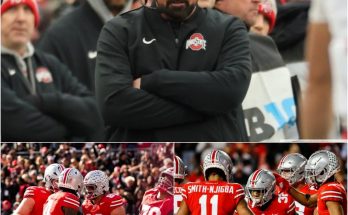In the wake of a contest whose final score often tells a story far simpler and crueler than the intricate tapestry of events that unfolded on the field, Florida State University head coach Mike Norvell stood before the media, his demeanor a complex blend of disappointment and resolute conviction. The result was not what anyone in Seminole colors had desired, but when questioned about the fundamental heart of his team, Norvell’s response was not one of finger-pointing or despondent critique. Instead, he delivered a powerful, almost defiant, affirmation of his players’ character. “I watched our guys — I didn’t think there was any effort issue. I thought our guys played hard, pushed, and competed to win.” This statement, made in the shadow of a loss, is more than just a coach defending his roster; it is a philosophical declaration, a window into the arduous process of building a program, and a nuanced argument about the often-misunderstood distinction between effort and execution.
To the casual observer, a loss can easily be misinterpreted as a lack of try, a deficiency of desire. The missed tackles, the stalled drives, the defensive lapses—they all blend into a narrative of a team that didn’t want it enough. Norvell’s comments directly challenge this superficial reading. He draws a critical line in the sand between the intangible quality of effort and the tangible product of performance. A player can give every ounce of his physical and emotional energy, can strain and push and compete with a ferocious will to win, and still come up short. This is the brutal, unforgiving nature of high-level sports. Effort is the foundation, the non-negotiable prerequisite without which no success is possible. But it is not, in itself, a guarantee of victory. It is the canvas upon which the masterpiece of execution must be painted.
Norvell’s praise in defeat is a strategic and cultural masterstroke. In the locker room following a tough loss, morale is a fragile entity. Players are grappling with their own frustrations and failures. For a coach to immediately and publicly question their effort would be to fracture the very trust that binds a team together. It would signal that the leadership does not believe in their commitment, a devastating blow that can create a schism between the staff and the roster. By unequivocally stating, “I thought our guys played hard, pushed, and competed to win,” Norvell is reinforcing the culture he has worked tirelessly to build. He is telling his players, “I see you. I see your sacrifice. I do not doubt your heart.” This validation, even in failure, fosters a profound sense of unity and resilience. It creates an environment where players are not afraid to fail, because they know their core effort will not be questioned. This safety net allows them to play freely, to learn from their mistakes without the paralyzing fear of being labeled lazy or uncommitted.
This then leads to the crucial second part of his statement, the pivot from the emotional to the technical: “[Stanford] did some things a little different, but we’ve got to trust our rules and techniques in every phase.” Here, Norvell moves from defending his team’s spirit to diagnosing the game’s ailment. He identifies the disconnect that occurred when the theoretical game plan met the unpredictable reality of the opponent’s strategy. Stanford’s adjustments—those “things a little different”—posed a test not of Florida State’s will, but of its wisdom and discipline. This is where effort alone is insufficient. A player can be running at full speed, but if he is running to the wrong gap, his effort is wasted. A defensive back can cover with intense passion, but if he abandons the technique drilled into him all week in a moment of improvisational panic, his effort becomes a liability.
“Trusting our rules and techniques” is the coaching mantra that separates great teams from merely hard-working ones. The “rules” are the schematic framework—the assignments, the coverage responsibilities, the offensive reads that are designed to counter any look an opponent might present. The “techniques” are the fundamental, repeatable physical actions—the proper footwork, the hand placement, the tackling form—that allow a player to execute his assignment successfully under duress. When a team is surprised by a new wrinkle from the opposition, the instinct is often to abandon the system and rely on individual heroism. This almost always leads to breakdowns. Norvell’s message is a call back to process over panic. He is acknowledging that the plan was sound, but the adherence to it under fire wavered. The players played hard, but they did not always play smart within the system they had been taught.
This entire scenario is a microcosm of the long-term building project that is college football. A culture is not built in victory; victory is the eventual byproduct of a culture that has been fortified in adversity. By praising the effort in a loss, Norvell is making an investment in the future. He is reinforcing the behaviors that will, over time, lead to consistent success. He is teaching his young men that while they cannot always control the final score, they can absolutely control their preparation, their passion, and their persistence. This lesson in accountability—not for the loss, but for the process—is invaluable. It shifts the focus from the unchangeable past to the malleable future. The question is no longer “Did we try hard enough?”—that box is checked. The question becomes, “How can we better trust our preparation and execute our techniques next time, so that our effort is fully realized?”
In the grand, often unforgiving theater of college football, Mike Norvell’s post-game comments serve as a poignant reminder that the story of a game is rarely binary. It is not simply a tale of winners and losers. There are layers of success and failure existing within the same sixty minutes. A team can fail in its execution and still succeed in demonstrating the foundational heart required for eventual greatness. By separating effort from outcome, Norvell is not making excuses. He is doing the hard, necessary work of a leader: he is protecting his team’s spirit while simultaneously challenging its intellect and discipline. He is affirming that the engine is running strong, even if the navigation needs refinement. For the Seminoles and their fans, this approach offers a hope that is more durable than the fleeting high of a single win. It is the hope that comes from knowing the program is built not on sand, but on the solid rock of relentless effort—a foundation that, once paired with flawless execution, can ultimately support the weight of championship aspirations. The loss to Stanford, therefore, becomes not a tombstone for a season, but a stepping stone in the longer journey, a moment where the coach looked past the scoreboard and saw the soul of his team, and chose to affirm it.



